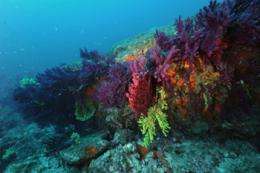Warming of the Mediterranean Sea hampers the resistance of corals and mollusks to ocean acidification

Some calcifiers (mussels, gastropods and corals) protect their shell or skeleton from the corrosive effects of increasing ocean acidification. They can therefore resist some of the damaging effects of increasing ocean acidity generated by the release of carbon dioxide (CO2) in the atmosphere through human activities. This resistance is diminished when organisms are exposed to extended period of elevated temperature (28.5°C). This is a result of an international study, co-lead by Jean-Pierre Gattuso, research scientist at Laboratoire d'océanographie de Villefranche, published in the journal Nature Climate Change. These results suggest that the ongoing and future warming of the Mediterranean combined with the rise of its acidity will increase the frequency of mass-mortality events.
The oceans absorb about one fourth of the carbon dioxide (CO2) released by the use of fossil fuel and changes in land use. This amounts to 1 million tons CO2 every hour and leads to large changes in the chemistry of seawater, including an increase in its acidity. This acidification threatens calcifying organisms, those that build shells and skeletons, such as mollusks and corals.
In this study, lead by R. Rodolfo-Metalpa, scientists relocated corals, gastropods and mussels around the island of Ischia (Gulf of Naples, Italy) where seawater is naturally acidified by CO2 vents linked to the volcanic activity of Vesuvio. The use of a radioactive tracer demonstrated that these organisms are able to produce limestone at the level of acidity expected for 2100 (pH of 7.8 versus 8.1 today), sometimes at even a higher rate. The tissues and organic layers covering the shells and skeletons play a major role to protect them from the corrosive action of high-acidity seawater. However, the areas of shells and skeletons that are not protected by tissues or organic layers are vulnerable and more prone to dissolution. The higher the acidity, the faster dissolution is. The scientists have shown that this capacity to resist is much lower when the organisms are subject to an extended period of elevated temperature (28.5°C). At this temperature, mortality is increasing with increasing acidity.
Some Mediterranean invertebrates already live at their upper limit of temperature tolerance and have already experienced mass-mortality events. The combined effect of warming and increased acidity will likely increase the frequency of these events in the future.
More information: R. Rodolfo-Metalpa, et al. 2011. Coral and mollusc resistance to ocean acidification adversely affected by warming. Nature Climate Change.
Provided by CNRS
















